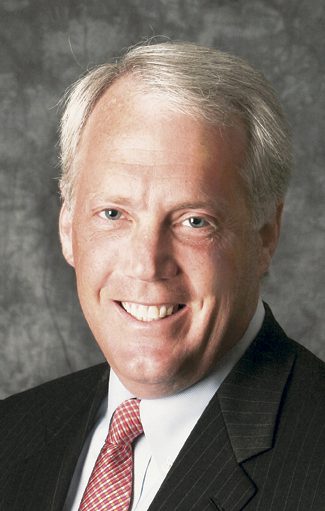AGENCY PARTNERS
COACHING A NEW GENERATION
InsurBanc focuses on educating—and financing—the next generation of agency owners
By Lori Widmer
Just one look at the InsurBanc “About Us” page reveals the primary focus of the Farmington, Connecticut-based financial institution. It’s all about agents.
What you won’t find on the page is the company history—InsurBanc is celebrating its 20th anniversary this month—nor will you find boilerplate information talking about the bank’s accomplishments. Instead, you will be presented with plenty of information on how agencies can navigate various business risks that their owners face, and how young agents can build their own career paths to ownership. Company news is a list of articles that, once again, educate agencies on how to avoid risks and plan for changing environments.
“We’ve made a point of being really good at knowing what’s happening to our client constituency, knowing what’s going on in the agents’ world, so that we can be better at taking care of them,” says InsurBanc President and CEO Dave Tralka.
Over the 20-year history of the bank, that means helping agencies through a credit crisis, a recession and, ultimately, a pandemic. By being strategic in their focus to serve the agency community beyond the role of lender, Tralka says the bank is able to be there for their agency customers.
Perhaps that focus stems from InsurBanc’s genesis. The bank was established through a partnership between the Independent Insurance Agents & Brokers of America (Big “I”) and the W. R. Berkley Corporation. The move was in response to what was happening in the industry at the time: Banks were buying agencies and, Tralka says, there was a need to “make sure independent agents had another tool in their arsenal.”
Hence, InsurBanc was born. As a bank created by the industry for insurance agents, the aim was to be the premier provider of growth capital to agencies with the ultimate goal to help them remain independent. The extension of that expertise has been to guide agencies to plan for perpetuation and execute the plan to enable young agents to prepare to take over as the next generation of agency owners.
It’s a focus that InsurBanc Executive Vice President and Chief Lending Officer Bob Pettinicchi says was lacking with traditional financial institutions. “We found out early in the process that agencies themselves were really underserved by traditional financing sources,” he says, “but the way to serve the audience was to be knowledgeable about the space, to be able to provide consultative services in addition to solely providing loans.”

—Bob Pettinicchi
Executive Vice President and Chief Lending Officer
The coaching aspect
Yet it’s more than consultative services that the bank delivers. InsurBanc’s articles and videos are more coaching tools designed to help agencies thrive, but also to help them with an issue that every agency faces at some point—perpetuation.
In fact, some of the agencies, whose owners were young agents at the time, were there with InsurBanc from the beginning and are now looking to groom the next generation of owners. As Pettinicchi says, “Young agents were the focus then, and it’s continued to be our focus now because a recurring theme of the industry then and now has been the challenge of bringing new talent into the industry.”
It’s also about giving agencies one more option. “People used to think there were two options: I keep the agency or I sell it,” says Tralka. He says InsurBanc now sees an appealing third option, namely selling gradually. By widening ownership to include younger agents, Tralka says current owners can remain in the picture while grooming the next generation of ownership. It’s a concept that wasn’t prevalent even 10 years ago, he notes.
That shifts the mindset a bit, Tralka says. “Most people think of it as a transaction. We think of it as more of a process, the process of getting to where you as an owner are best situated personally and where the future health and well-being of the agency is paramount.”
Tralka says InsurBanc has worked with agency owners for years on their ownership plans. It’s part of making sure the transaction, when it happens, is the best fit for that current owner. And for the future owner, as well.
Young agents, says Tralka, need access to capital, but they also need access to the expertise that can help them thrive as business owners. It’s a long process, says Tralka, and one that InsurBanc is invested in helping along. “It’s not like you wake up and say you’re going to buy the agency today. It’s more ‘This is where I want my career to go, and how do I get there? Who’s going to help me?’”
Tralka says that’s where InsurBanc’s focus really pays off for young agents. Ultimately, a transaction will have to take place; but the end game, he says, is getting there in a way that is sustainable for the buyer agent. That’s where many traditional lenders fail—over-leveraging a company to the point it cannot survive. “There’s a lot of nuancing,” Tralka says, “but there’s also a lot of math. Can people keep staff employed? Can they grow their own wealth over time, and is there coverage of the debt that’s put in place to make these transactions happen?”

—Dave Tralka
President and CEO
Building the agency brand
And can they sustain and grow the business once they’re at the helm? That’s the pain point for nearly every agency, says Pettinicchi. He says agencies need to be putting plenty of effort into building a recognizable brand.
Right now, Tralka says, branding is “all over the map, due to the fragmented nature of the industry.” While some efforts do exist to bring a branding process to agencies—Trusted Choice, for example, is a branding approach for independent agents to increase their brand awareness—many agencies cobble together a business that doesn’t differentiate from the competition. “The value that the agency brings to a community is the question,” says Tralka. “How do you tell your story?”
Tralka and Pettinicchi advise agencies to think beyond a mere website and storefront. Approach the marketplace with information, using platforms like YouTube and social media. Have technology become an extension of the brand and, in doing so, an extension of the consultative selling approach, Tralka says. “It’s the opposite of ‘call me and I’ll sell you insurance.’ You’re helping businesses and individuals effectively put together a risk management program to protect the livelihoods of their assets.”
That branding of an agent as a consultative seller is a page taken from the InsurBanc playbook, which has practiced that same branding approach since its inception. The consultative agent reaps the benefits of referrals and testimonials and earns a reputation of being a trusted resource in the community. “These are all effective tools, and what’s changed in the last 10 years is how agents are able to get their message out,” says Tralka. “If they can do that effectively, then their branding comes into form.”
It’s a method that has become so ingrained in the InsurBanc culture that, even as they spoke, Tralka and Pettinicchi couldn’t help but put on their consulting hats. Agencies, they say, can hone their brand by asking some key questions of their customers: “Do I respond to you in the way you need me to? Am I communicating with you the way you want to be connected? That reinforces the brand,” says Tralka.
A strong brand goes a long way toward a stronger, more successful independent agency. Pettinicchi says agencies with a strong brand are more valuable in the market. That in itself can feed into the success of the business. “Agencies that are able to figure out how to grow and expand their talent are the ones that have the best chance of staying independent longer.”
The talent trifecta
That last wish list item, expanding talent, is still another challenge independent agencies face. Yet Pettinicchi says getting the right talent into the agency is made easier when there is a definable brand and a clear growth path, particularly if the talent is the young agent who has an eye toward someday owning their own agency.
Attracting young talent “keeps the industry moving,” says Pettinicchi. Despite many predictions of agents becoming obsolete or the industry delivery method morphing into a different distribution model, Pettinicchi says that, overwhelmingly, insurance is still distributed by agents.
Attracting that talent, he adds, has just become a little easier thanks to the pandemic. “COVID has accelerated the transformation of business and opened up avenues for agencies. They can look beyond their local area in terms of bringing employees in or adding specialties.”
Such organic agency growth, fueled by dynamic producers and leveraged by technology, creates a strong brand that is differentiated from a commodity, says Pettinicchi. For an independent agency in a highly competitive environment, the strength of your brand and the creation of value is everything. “Maintaining independence can be a tremendous way of building value over time and building a business that is worth a lot more over time than selling out.”
For more information:
InsurBanc
www.insurbanc.com
The author
Lori Widmer is a Philadelphia-based writer and editor who specializes in insurance and risk management.






